 I’m going to write a full post about this episode of Koi wa Ameagari no You ni, of course, but I just want to start off with the lead – Watanabe Ayumu is a truly spectacular director. He’s well-known and well-respected, of course, but somehow still not given the credit he deserves. Only a legitimately great anime director could helm an episode as technically stunning and subtly powerful as this one was. I can think of a few names – that other Watanabe, Kamiyama Kenji, Morita Shuuhei, Tachikawa Yuzuru, a couple more – but it’s a very short list indeed.
I’m going to write a full post about this episode of Koi wa Ameagari no You ni, of course, but I just want to start off with the lead – Watanabe Ayumu is a truly spectacular director. He’s well-known and well-respected, of course, but somehow still not given the credit he deserves. Only a legitimately great anime director could helm an episode as technically stunning and subtly powerful as this one was. I can think of a few names – that other Watanabe, Kamiyama Kenji, Morita Shuuhei, Tachikawa Yuzuru, a couple more – but it’s a very short list indeed.
 The one word that kept popping into my mind throughout this ep was “lovely”. It was a marvel of taste and understatement, gorgeously drawn and animated by the Wit team, and that music – Yoshimata Ryo’s soundtrack was absolutely gorgeous this week. Yoshimata is not a name much associated with anime (he’s only scored one other series that I know of, and that almost two decades ago) but his music was the perfect choice to pair with this material. I don’t often lead with two paragraphs about the production and direction side of an episode, but this one is a deserving exception.
The one word that kept popping into my mind throughout this ep was “lovely”. It was a marvel of taste and understatement, gorgeously drawn and animated by the Wit team, and that music – Yoshimata Ryo’s soundtrack was absolutely gorgeous this week. Yoshimata is not a name much associated with anime (he’s only scored one other series that I know of, and that almost two decades ago) but his music was the perfect choice to pair with this material. I don’t often lead with two paragraphs about the production and direction side of an episode, but this one is a deserving exception.
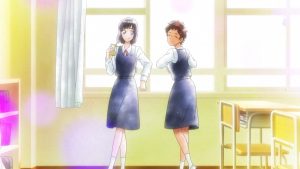 This ep is a stark reminder that not that much has to actually happen for an episode to be powerful and impactful. A self-assured director like Watanabe-sensei can sit back and tell a story with few words, let the faces of the characters and the mood in the room advance the story far more elegantly than dramatic events. An awful lot of this week was nothing more than characters looking at other characters and revealing so much with their eyes – and even at that, much of it through the perspective of a seemingly minor character, Akira’s childhood friend Haruka. But in the hands of a master storyteller like Watanabe, no character is insignificant.
This ep is a stark reminder that not that much has to actually happen for an episode to be powerful and impactful. A self-assured director like Watanabe-sensei can sit back and tell a story with few words, let the faces of the characters and the mood in the room advance the story far more elegantly than dramatic events. An awful lot of this week was nothing more than characters looking at other characters and revealing so much with their eyes – and even at that, much of it through the perspective of a seemingly minor character, Akira’s childhood friend Haruka. But in the hands of a master storyteller like Watanabe, no character is insignificant.
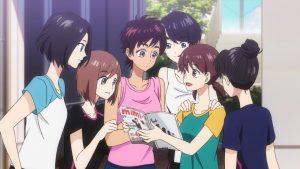 Haruka has been looking at Akira’s beauty and marveling at it for a long time, it seems – admiring her running form, and as she grew into a teenager, her form generally. It’s clear even to Haruka, surely, that Akira doesn’t reciprocate her romantic feelings – but I think Haruka is much more hurt that Akira doesn’t seem to think of her as much more than a “running friend”. It’s not that Akira is being mean – these two people simply see each other differently, and once Akira’s running career ended (at least temporarily) she seems to have largely shut anyone connected to it out of her life. Perhaps she really does feel more affection for Haruka than she lets on, and associates her so much with track that being with her is too painful – but from Haruka’s perspective, there’s little difference.
Haruka has been looking at Akira’s beauty and marveling at it for a long time, it seems – admiring her running form, and as she grew into a teenager, her form generally. It’s clear even to Haruka, surely, that Akira doesn’t reciprocate her romantic feelings – but I think Haruka is much more hurt that Akira doesn’t seem to think of her as much more than a “running friend”. It’s not that Akira is being mean – these two people simply see each other differently, and once Akira’s running career ended (at least temporarily) she seems to have largely shut anyone connected to it out of her life. Perhaps she really does feel more affection for Haruka than she lets on, and associates her so much with track that being with her is too painful – but from Haruka’s perspective, there’s little difference.
 For Akira’s part, she of course is still thinking mostly about Masami-san – about what she saw at his apartment, and what it might say about him as a man. After a very funny detour where she overhears two little girls talking about the “Mukihiko” character keychain being a love charm and tries in vain to procure it (Haruka eventually bails her out) Akira takes a trip to the library on a rainy day to try to understand Junbun (“pure literature”). Every moment of this is to be treasured – the streetscapes set to Yoshimata’s score, Akira stopping to walk a stranger without an umbrella to his destination (so Japanese). Nary a word of dialogue accompanies any of this, and none is needed – the story is told through the images and music. Yokohama in the rain has surely never been so beautiful.
For Akira’s part, she of course is still thinking mostly about Masami-san – about what she saw at his apartment, and what it might say about him as a man. After a very funny detour where she overhears two little girls talking about the “Mukihiko” character keychain being a love charm and tries in vain to procure it (Haruka eventually bails her out) Akira takes a trip to the library on a rainy day to try to understand Junbun (“pure literature”). Every moment of this is to be treasured – the streetscapes set to Yoshimata’s score, Akira stopping to walk a stranger without an umbrella to his destination (so Japanese). Nary a word of dialogue accompanies any of this, and none is needed – the story is told through the images and music. Yokohama in the rain has surely never been so beautiful.
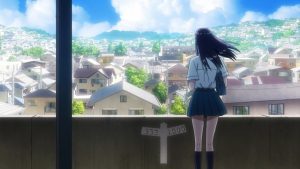 All this builds up to a quietly climactic scene at the library, where Akira runs into Masami-san (in glasses). Not being a resident he can’t borrow books, but he loves to browse, as the selection is the biggest in Yokohama. Akira discreetly (or perhaps not so much) tries to get Kondou’s recommendation on a book, to gain a glimpse into his soul, but he defers (only later suspecting what was really afoot). Kondou-san describes the library as a sea of books, and Watanabe-sensei goes on to put this thought into practice in truly stunning fashion – but it’s interesting that Akira thinks of it as more of an aquarium. Where, one wonders, does she imagine books to be living freely and not kept in captivity?
All this builds up to a quietly climactic scene at the library, where Akira runs into Masami-san (in glasses). Not being a resident he can’t borrow books, but he loves to browse, as the selection is the biggest in Yokohama. Akira discreetly (or perhaps not so much) tries to get Kondou’s recommendation on a book, to gain a glimpse into his soul, but he defers (only later suspecting what was really afoot). Kondou-san describes the library as a sea of books, and Watanabe-sensei goes on to put this thought into practice in truly stunning fashion – but it’s interesting that Akira thinks of it as more of an aquarium. Where, one wonders, does she imagine books to be living freely and not kept in captivity?
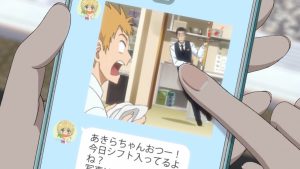 Left on her own to choose, Akira wonders if photo books count as reading, and finally settles on Botchan by Souseki Natsume (arguably the most famous modern novel in Japanese and written less than a mile from my Tokyo apartment). More significantly, she also chooses a photo book on running. And when she offers to check out a book for Masamai-san (clever girl), he chooses “Window by the Wave” by Kujo Chihiro – and judging by his rueful demeanor as he ponders it, one suspects that Kujo-sensei is his ex-wife and Yuuto’s mother. The symbolism of this is inescapable – each of them returning to their “previous” love, at least for the moment. Where this leaves Masami and Akira in their perception of each other remains to be seen, but if that question plays out through episodes as lovely and memorable as this one I’m happy to wait as long as it takes to find out.
Left on her own to choose, Akira wonders if photo books count as reading, and finally settles on Botchan by Souseki Natsume (arguably the most famous modern novel in Japanese and written less than a mile from my Tokyo apartment). More significantly, she also chooses a photo book on running. And when she offers to check out a book for Masamai-san (clever girl), he chooses “Window by the Wave” by Kujo Chihiro – and judging by his rueful demeanor as he ponders it, one suspects that Kujo-sensei is his ex-wife and Yuuto’s mother. The symbolism of this is inescapable – each of them returning to their “previous” love, at least for the moment. Where this leaves Masami and Akira in their perception of each other remains to be seen, but if that question plays out through episodes as lovely and memorable as this one I’m happy to wait as long as it takes to find out.


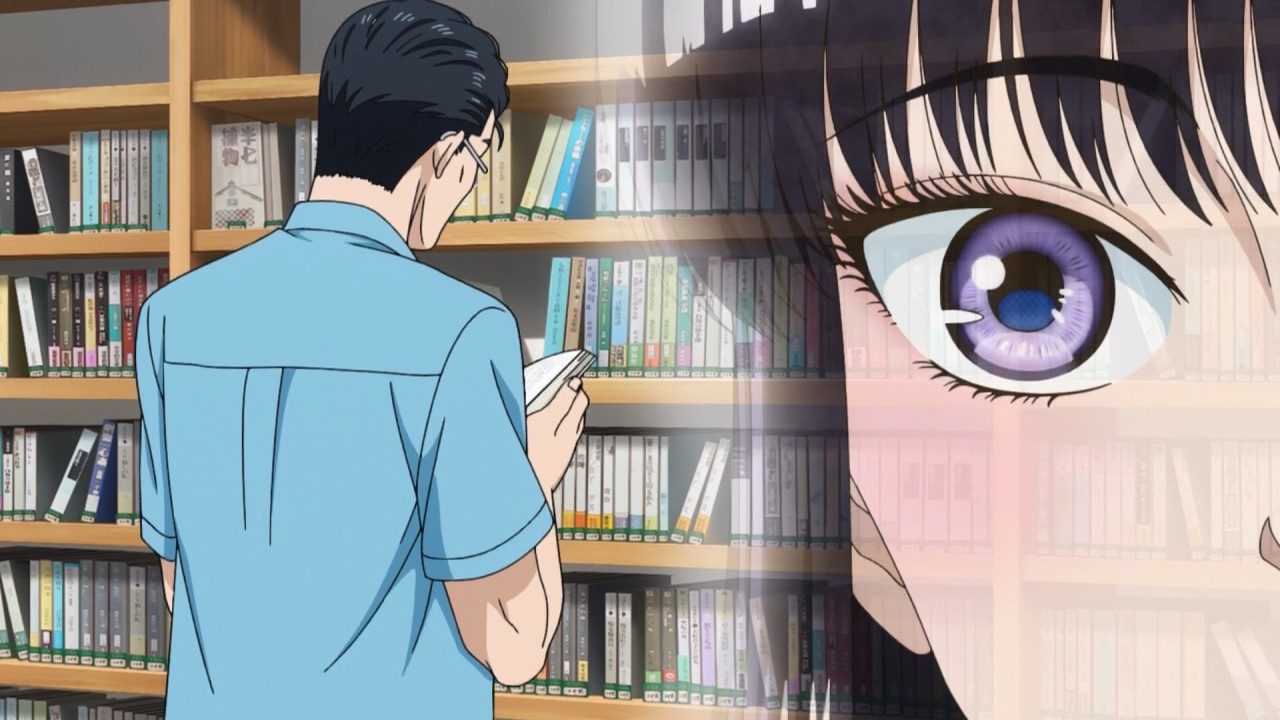


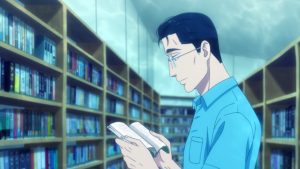
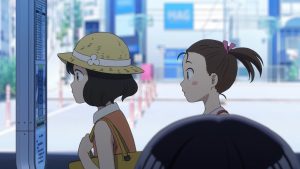
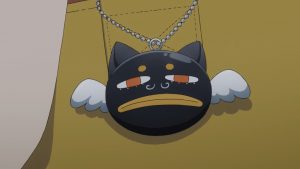
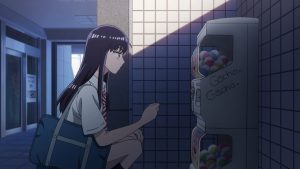





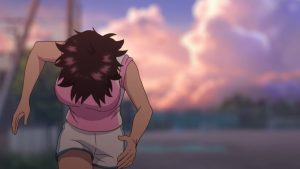
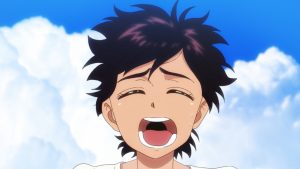

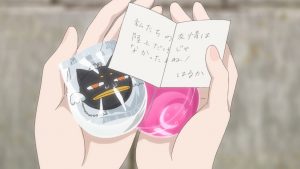
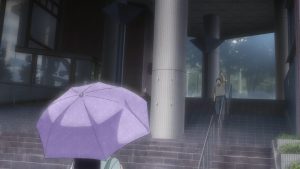
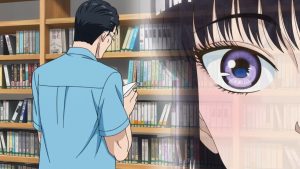
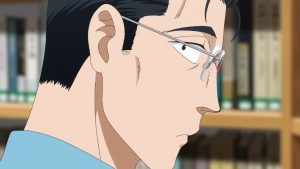

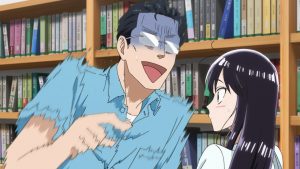
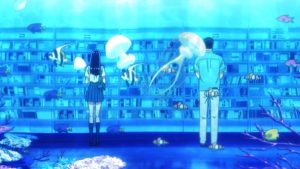




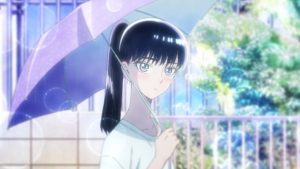

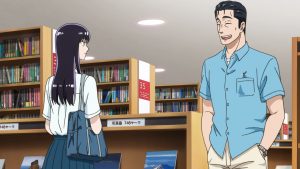
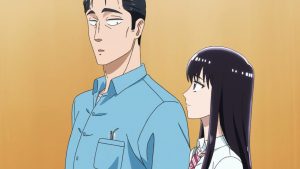

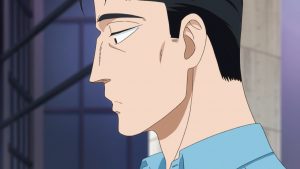
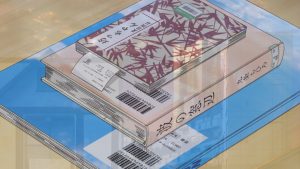
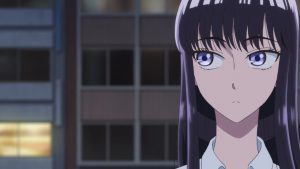

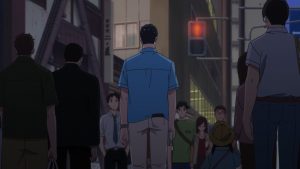
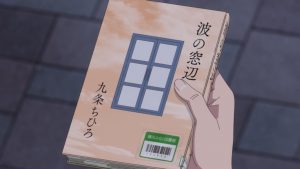

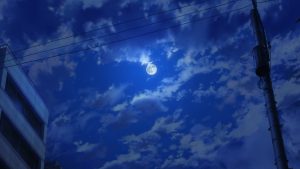


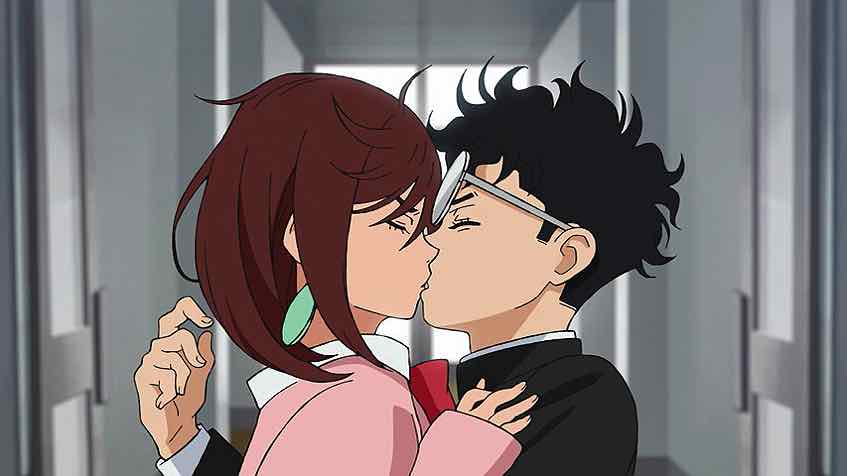
Salary Dam
February 15, 2018 at 9:53 pmHappy to see that you’ve been enjoying the anime so much! All the subtle storytelling with “nothing” happening was present in the manga from the start, only presented in different forms e.g. clever panelling and shading, but I agree that Watanabe Ayumu has been doing a splendid direction which elevated the manga’s charms further.
As for the aquarium thing, I think Akira doesn’t really put much thought into the books themselves; she just likened their situation into being in an aquarium because a lot of people go into dates in the aquarium in Japan. Her and Kondou standing in front of the shelves look similar to how people would look like when they’re standing in front of the fish tank too. But this is just my interpretation of course.
Guardian Enzo
February 15, 2018 at 11:01 pmI’m not dissing the manga, believe me – I haven’t read it, but I think the fact that the source material is well-written shines through in the anime. It’s just that this episode particularly was a master class in anime direction – a stunning job by Watanabe.
As for the aquarium thing, it may be the frustrated poet in me who interpreted it the way I did, and no more than that.
Salary Dam
February 15, 2018 at 11:59 pmI didn’t get the impression that you were dissing the manga at all, honestly just vaguely trying to get you to consider picking up the manga once the anime ends since it’s very great 😉
Actually, Watanabe has not only translated the charms of the manga perfectly, he also added some lovely anime-original details, particularly in this ep. So yeah I’m really glad he’s the one handling this adaptation.
DauntingOverlord
February 15, 2018 at 10:32 pmJust wow, what an episode. Not what I expected at all and was enthralled from start to finish. I do find it funny that Akira seems to run into Kondou every time it’s raining. Whenever it’s raining in general, I find myself paying more attention to the smaller details. (In one scene we actually see a flash of lightning in the background during one of the early scenes, surprised me. No focus on it at all, and it was a blink and you miss it sort of deal).
Guardian Enzo
February 15, 2018 at 10:59 pmWatanabe is great for small details. For example, Haruka’s brother trying to keep up with her and just barely being seen (and heard) for a moment as she chases after Akira. Necessary? No – but a lovely bit of detail.
sonicsenryaku
February 16, 2018 at 2:44 amThis anime does what I wish so many anime would do more of, that is eliminating this need to have characters telling us how they feel all the damn time through self-indulgent monologuing. One of things i noticed right off the bat when jumping into the series is the lack of what i like to call, “emotional exposition.” This is why we have a fair degree of youngins (and even adults) who frequently watch anime that think that good storytelling and rich character development need characters to monologue and explain every feeling they have to the viewer light novel style….*shudder*; that’s not good writing at all. I blame the monogatari series hahaha (at least the times that it does it wrong) There’s a way to use monologues to enhance storytelling and anime gets it wrong a large percent of the time.
God this episode was filled with so much juicy subtext; this is what i like to see: A character drama that actually establish well-thought out and evocative character conflicts, motivations, and tensions while actively sewing all its thematic messages with mesmerizing visuals and elusive but resonant soundtrack. I was sold on this series after the first minute of ep 1; what a visual and storytelling treat this show has been.
Guardian Enzo
February 16, 2018 at 7:48 amIt’s funny that you say that, because one of the names I internally use for this is the Monogatari Effect. More generally it’s the LN Effect, and he’s just the most egregious example. I know it pisses LN fans off and that there are exceptions, but in general LNs rely on this kind of exposition by explanation (most annoyingly where emotions are concerned), and it’s had a corrosive effect on anime.
justfun
February 16, 2018 at 4:40 amWhere did you get the notion that Haruka has romantic feelings for Akira? She is clearly admiring her, but was anything more said or shown?
Guardian Enzo
February 16, 2018 at 7:50 amI suppose it’s subject to interpretation, but it seemed quite obvious to me (the effects Watanabe used didn’t do anything to suggest otherwise). I feel like this is tied into the comment thread above – just because no one came out and said “I like you!” that doesn’t mean the idea wasn’t communicated more subtly.
Let me ask you this – if you watched this episode again and Haruka were a boy, would there be any doubt in your mind that he had feelings for Akira?
DauntingOverlord
February 16, 2018 at 8:38 amTo be honest, I only see two girls that used to be really close together as friends, and when Akira lost running, both of them found each other drifting away. “Our friendship isn’t all about track and field is it?” That’s what Haruka’s been thinking about this entire time. The moment Akira left track and field, their time together ceased to be and Haruka wanted them to start acting like friends again.
justfun
February 16, 2018 at 10:38 amRomance framed by anime would be shown in other imagery, like longing gazes or subtle touches between the characters – and the series is very traditional in this regard. I’m with DauntingOverlord on this one, people can have strong connections without being romantically attached. Even if I imagine Haruka as a boy.
Now one could argue that love and romance is involved in every kind of deep relationship (When Harry Met Sally…, anyone?), but obviously this series is not about these themes. At least not with Akira and Haruka.
Guardian Enzo
February 16, 2018 at 11:30 amWell, I don’t see that the series has to be “about” them for them to exist in it.
In looking over the broad pool of reaction to this episode, I can see some people saw romantic interest, and some didn’t. Whether it was intended to be ambiguous or not that’s clearly how it played out. And I’m perfectly fine with that – even if there were no mention of it for the rest of the story, that wouldn’t mean we weren’t supposed to see it, necessarily. People are complicated and so are their feelings. Maybe Haruka herself wouldn’t even be sure if she felt anything or not.
justfun
February 16, 2018 at 11:41 amRomance or not, you are right that this was one of the better episodes of the series. I have a few reservations about the show, but they were not as present in this episode as in other ones.
UndeadCalamari
February 16, 2018 at 12:08 pmWhile my concerns about the premise of this show remain, holy hell this was a gorgeous episode on so many levels. Definitely my favorite of the series this far.
Rrr
February 16, 2018 at 1:13 pmCould you please give the names of your favourite female directors?
Guardian Enzo
February 16, 2018 at 1:30 pmThere are distressingly few in anime, but Matsumoto Rie would certainly be the first to come to mind for me as a “favorite”. Eunyoung Choi is known mostly for working under Yuasa but her work when she’s in-charge is quite impressive. Yamamoto Sayo is obviously very talented, though I often find her aesthetic isn’t to my taste. Deai Kotomi is rock solid.
Stöt
April 1, 2018 at 1:24 amWell, with what Sora Yori mo Tooi Basho became, it’s clear that Ishizuka Atsuko is going to be right at the top of that list. That show was amazing. Over on RandomC, it’s on Stilts top 5- top 10 anime of all time! And I have a hard time disagreeing.
Dein
February 16, 2018 at 2:45 pmSo far this has to be my favourite episode of the bunch in an already excellent series. It’s incredible how much the right director and source material can convey without getting bogged down in pointless conversations.
I’d also like to say that the last scene left a huge impression on me, all the way down to the very last frame. I can’t quite put my finger on it, but it was quite… something.
Mayuf
February 16, 2018 at 7:19 pmThanks you for admin ,rilis anime 😀
blair
February 18, 2018 at 8:26 pm“…each of them returning to their “previous” love, at least for the moment”. omg that was soo deep! i need to go back and watch that episode after reading this. thank you!
Aziz
June 29, 2020 at 1:18 amwait that means the book of window by the wave isnt real?